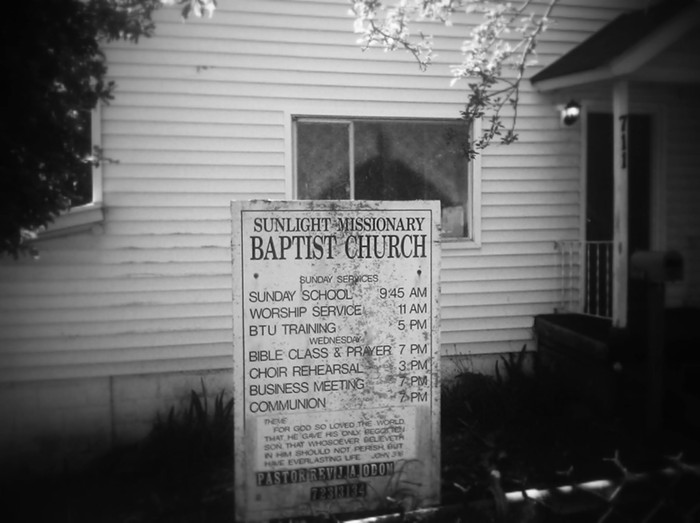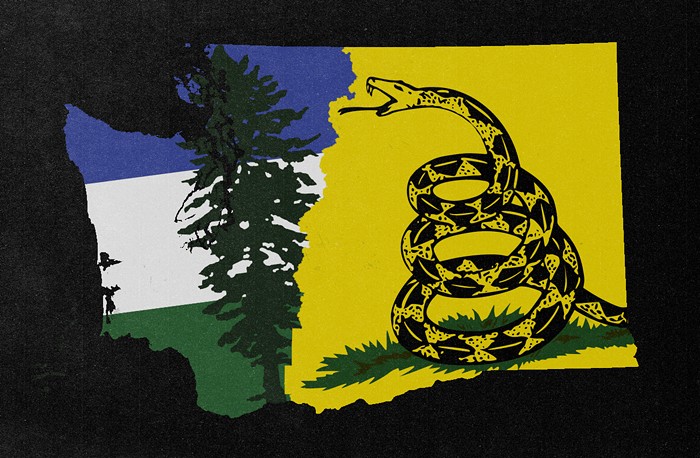
Throwing Shade, the politics and pop culture podcast on the Maximum Fun network, is coming to Neumos tonight. Comedians Erin Gibson and Bryan Safi, who pledge to tackle “all the issues important to ladies and gays,” are also busy drumming up interest in the half-hour TV version of the podcast that will premiere on TV Land in January.
What makes Throwing Shade’s podcast and future television endeavors exciting is that they turn the personal into the political. “There’s not a show that exists hosted by a woman and a gay man that covers politics,” said Safi when I spoke with him this week, “and right now there’s so much affecting those groups, I think it will be nice to hear more from the people who are affected.”
Gibson and Safi gave specific love to Samantha Bee’s Full Frontal for paving the way for a show like Throwing Shade to hit the cable airwaves. Though they promise they’ll be outraged and informative as needed, they also intend to be a bit more playful. “On the podcast,” Bryan said, “we are exploring and learning about these stories with our audience. We’re not authorities.”
Throwing Shade’s live show will provide fans an opportunity to see Bryan and Erin, both UCB LA alums, stretch their comedic muscles. “So much of the podcast is improvised,” Safi explained, “and the live show is 80% solid written jokes.” The other 20% is more of the freewheeling discussion their podcast usually has, and includes an audience interaction bit that I do not want to spoil, but sounds phenomenal, and I say that as someone who generally does not go for audience interaction at all.

Though they look through different lenses, Throwing Shade’s comedic engagement with the national political dialogue is matched locally by Brett Hamil’s The Seattle Process. Hamil’s monthly show at Northwest Film Forum looks specifically at the absurdity and treachery of Seattle’s political climate. The show arose from a series of videos that Hamil, a local stand-up comic and writer, made to vent his anger at his internet provider. He then dug deeper and discovered political connections that contributed to Comcast’s stranglehold on local cable and internet service. That led him down a deep rabbit hole of local political corruption, which he continues to critique in his stand-up.
From those humble beginnings emerged the wide-ranging Seattle Process, which Hamil hosts alongside local sketch comedian and perpetual political neophyte Travis Vogt. The show also features guest appearances from the likes of recent congressional primary winner Pramila Jaylapal, socialist city council member Kshama Sawant, and a slate of other local political heavyweights and comedic talents. Despite a slate of increasingly heavy politicians sharing his stage, Hamil’s focus remains on the comedy. “The point of the show is not just to critique local politics, because that sounds boring as fuck,” Hamil explained, “it’s to make it entertaining.”
Despite one being focused on local issues and one national, The Seattle Procss and Throwing Shade have a lot of obvious things in common. “We live in a time when it’s impossible for comedy to be politically inactive,” Bryan Safi said. If that’s true, then maybe it’s not out of the question to extend the analogy and urge Hamil to follow Gibson and Safi’s example and bring his stage show to TV.
The notion of Seattle having a local analogue to a nationally televised comedy has strong historical precedent. Of course I’m talking about Almost Live, which launched the careers of Joel McHale, Lauren Weedman, and Bill Nye, and continues to air in modified form as Up Late NW. Almost Live mirrored SNL’s sketch comedy format. With all due respect to the High-Fiving White Guys (which may have been political if you read them as an unintended critique of the white supremacy? Maybe? No? Guys? Is this thing on?) Almost Live never really sharpened the daggers for Seattle politics.
So consider this a plea to whatever powers that be exist in Seattle capable of making local televised political comedy happen: do it. If a network that specializes in Happy Days reruns can be the first to pair an openly gay man and a woman as political talk show hosts, surely there’s a local broadcast network affiliate with the brains to throw some resources behind Seattle’s closest equivalent to John Oliver.














